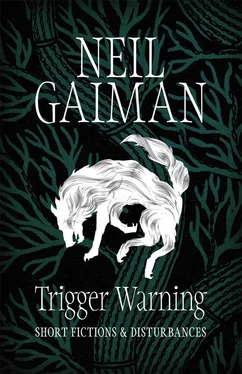Neil Gaiman - Trigger Warning - Short Fictions and Disturbances
Здесь есть возможность читать онлайн «Neil Gaiman - Trigger Warning - Short Fictions and Disturbances» весь текст электронной книги совершенно бесплатно (целиком полную версию без сокращений). В некоторых случаях можно слушать аудио, скачать через торрент в формате fb2 и присутствует краткое содержание. Год выпуска: 2015, Издательство: Headline, Жанр: Старинная литература, на английском языке. Описание произведения, (предисловие) а так же отзывы посетителей доступны на портале библиотеки ЛибКат.
- Название:Trigger Warning: Short Fictions and Disturbances
- Автор:
- Издательство:Headline
- Жанр:
- Год:2015
- ISBN:нет данных
- Рейтинг книги:4 / 5. Голосов: 1
-
Избранное:Добавить в избранное
- Отзывы:
-
Ваша оценка:
- 80
- 1
- 2
- 3
- 4
- 5
Trigger Warning: Short Fictions and Disturbances: краткое содержание, описание и аннотация
Предлагаем к чтению аннотацию, описание, краткое содержание или предисловие (зависит от того, что написал сам автор книги «Trigger Warning: Short Fictions and Disturbances»). Если вы не нашли необходимую информацию о книге — напишите в комментариях, мы постараемся отыскать её.
Trigger Warning: Short Fictions and Disturbances — читать онлайн бесплатно полную книгу (весь текст) целиком
Ниже представлен текст книги, разбитый по страницам. Система сохранения места последней прочитанной страницы, позволяет с удобством читать онлайн бесплатно книгу «Trigger Warning: Short Fictions and Disturbances», без необходимости каждый раз заново искать на чём Вы остановились. Поставьте закладку, и сможете в любой момент перейти на страницу, на которой закончили чтение.
Интервал:
Закладка:
The dwarfs did not speak to her as they walked the deep paths, except, on more than one occasion, to say, ‘Mind your head.’
***
‘Have you noticed,’ asked the shortest of the dwarfs, ‘something unusual?’ They had names, the dwarfs, but human beings were not permitted to know what they were, such things being sacred.
The queen had a name, but nowadays people only ever called her Your Majesty. Names are in short supply in this telling.
‘I have noticed many unusual things,’ said the tallest of the dwarfs.
They were in Goodmaster Foxen’s inn.
‘Have you noticed, that even amongst all the sleepers, there is something that does not sleep?’
‘I have not,’ said the second tallest, scratching his beard. ‘For each of them is just as we left him or her. Head down, drowsing, scarcely breathing enough to disturb the cobwebs that now festoon them . . .’
‘The cobweb spinners do not sleep,’ said the tallest dwarf.
It was the truth. Industrious spiders had threaded their webs from finger to face, from beard to table. There was a modest web in the deep cleavage of the pot girl’s breasts. There was a thick cobweb that stained the sot’s beard grey. The webs shook and swayed in the draught of air from the open door.
‘I wonder,’ said one of the dwarfs, ‘whether they will starve and die, or whether there is some magical source of energy that gives them the ability to sleep for a long time.’
‘I would presume the latter,’ said the queen. ‘If, as you say, the original spell was cast by a witch, seventy years ago, and those who were there sleep even now, like Red-beard beneath his hill, then obviously they have not starved or aged or died.’
The dwarfs nodded. ‘You are very wise,’ said a dwarf. ‘You always were wise.’
The queen made a sound of horror and of surprise.
‘That man,’ she said, pointing. ‘He looked at me.’
It was the fat-faced man. He had moved slowly, tearing the webbing, moved his face so that he was facing her. He had looked at her, yes, but he had not opened his eyes.
‘People move in their sleep,’ said the smallest dwarf.
‘Yes,’ said the queen. ‘They do. But not like that. That was too slow, too stretched, too meant .’
‘Or perhaps you imagined it,’ said a dwarf.
The rest of the sleeping heads in that place moved slowly, in a stretched way, as if they meant to move. Now each of the sleeping faces was facing the queen.
‘You did not imagine it,’ said the same dwarf. He was the one with the red-brown beard. ‘But they are only looking at you with their eyes closed. That is not a bad thing.’
The lips of the sleepers moved in unison. No voice, only the whisper of breath through sleeping lips.
‘Did they just say what I thought they said?’ asked the shortest dwarf.
‘They said, “Mama. It is my birthday”,’ said the queen, and she shivered.
***
They rode no horses. The horses they passed all slept, standing in fields, and could not be woken.
The queen walked fast. The dwarfs walked twice as fast as she did, in order to keep up.
The queen found herself yawning.
‘Bend over, towards me,’ said the tallest dwarf. She did so. The dwarf slapped her around the face. ‘Best to stay awake,’ he said, cheerfully.
‘I only yawned,’ said the queen.
‘How long, do you think, to the castle?’ asked the smallest dwarf.
‘If I remember my tales and my maps correctly,’ said the queen, ‘the Forest of Acaire is about seventy miles from here. Three days’ march.’ And then she said, ‘I will need to sleep tonight. I cannot walk for another three days.’
‘Sleep, then,’ said the dwarfs. ‘We will wake you at sunrise.’
She went to sleep that night in a hayrick, in a meadow, with the dwarfs around her, wondering if she would ever wake to see another morning.
***
The castle in the Forest of Acaire was a grey, blocky thing, all grown over with climbing roses. They tumbled down into the moat and grew almost as high as the tallest tower. Each year the roses grew out further: close to the stone of the castle there were only dead, brown stems and creepers, with old thorns sharp as knives. Fifteen feet away the plants were green and the blossoming roses grew thickly. The climbing roses, living and dead, were a brown skeleton, splashed with colour, that rendered the grey fastness less precise.
The trees in the Forest of Acaire were pressed thickly together, and the forest floor was dark. A century before, it had been a forest only in name: it had been hunting lands, a royal park, home to deer and wild boar and birds beyond counting. Now the forest was a dense tangle, and the old paths through the forest were overgrown and forgotten.
***
The fair-haired girl in the high tower slept.
All the people in the castle slept. Each of them was fast asleep, excepting only one.
The old woman’s hair was grey, streaked with white, and was so sparse her scalp showed. She hobbled, angrily, through the castle, leaning on her stick, as if she were driven only by hatred, slamming doors, talking to herself as she walked. ‘Up the blooming stairs and past the blooming cook and what are you cooking now, eh, great lard-arse, nothing in your pots and pans but dust and more dust, and all you ever ruddy do is snore.’
Into the kitchen garden, neatly tended. The old woman picked rampion and rocket, and she pulled a large turnip from the ground.
Eighty years before, the palace had held five hundred chickens; the pigeon coop had been home to hundreds of fat white doves; rabbits had run, white-tailed, across the greenery of the grass square inside the castle walls; and fish had swum in the moat and the pond: carp and trout and perch. There remained now only three chickens. All the sleeping fish had been netted and carried out of the water. There were no more rabbits, no more doves.
She had killed her first horse sixty years back, and eaten as much of it as she could before the flesh went rainbow-coloured and the carcass began to stink and crawl with blue flies and maggots. Now she only butchered the larger mammals in midwinter, when nothing rotted and she could hack and sear frozen chunks of the animal’s corpse until the spring thaw.
The old woman passed a mother, asleep, with a baby dozing at her breast. She dusted them, absently, as she passed, made certain that the baby’s sleepy mouth remained on the nipple.
She ate her meal of turnips and greens in silence.
***
It was the first great grand city they had come to. The city gates were high and impregnably thick, but they were open wide.
The three dwarfs were all for going around it, for they were not comfortable in cities, distrusted houses and streets as unnatural things, but they followed their queen.
Once in the city, the sheer numbers of people made them uncomfortable. There were sleeping riders on sleeping horses; sleeping cabmen up on still carriages that held sleeping passengers; sleeping children clutching their balls and hoops and the whips for their spinning tops; sleeping flower women at their stalls of brown, rotten, dried flowers; even sleeping fishmongers beside their marble slabs. The slabs were covered with the remains of stinking fish, and they were crawling with maggots. The rustle and movement of the maggots was the only movement and noise the queen and the dwarfs encountered.
‘We should not be here,’ grumbled the dwarf with the angry brown beard.
‘This road is more direct than any other road we could follow,’ said the queen. ‘Also it leads to the bridge. The other roads would force us to ford the river.’
The queen’s temper was equable. She went to sleep at night, and she woke in the morning, and the sleeping sickness had not touched her.
Читать дальшеИнтервал:
Закладка:
Похожие книги на «Trigger Warning: Short Fictions and Disturbances»
Представляем Вашему вниманию похожие книги на «Trigger Warning: Short Fictions and Disturbances» списком для выбора. Мы отобрали схожую по названию и смыслу литературу в надежде предоставить читателям больше вариантов отыскать новые, интересные, ещё непрочитанные произведения.
Обсуждение, отзывы о книге «Trigger Warning: Short Fictions and Disturbances» и просто собственные мнения читателей. Оставьте ваши комментарии, напишите, что Вы думаете о произведении, его смысле или главных героях. Укажите что конкретно понравилось, а что нет, и почему Вы так считаете.







